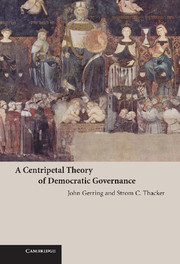Book contents
- Frontmatter
- Contents
- List of Figures
- List of Tables
- Acknowledgments
- A Centripetal Theory of Democratic Governance
- 1 Models of Governance
- PART ONE CAUSAL MECHANISMS
- PART TWO EMPIRICS
- PART THREE CONCLUSIONS
- Appendix A Defining Good Governance
- Appendix B Alternative Theories Revisited
- Sources
- Author Index
- Subject Index
PART TWO - EMPIRICS
Published online by Cambridge University Press: 06 July 2010
- Frontmatter
- Contents
- List of Figures
- List of Tables
- Acknowledgments
- A Centripetal Theory of Democratic Governance
- 1 Models of Governance
- PART ONE CAUSAL MECHANISMS
- PART TWO EMPIRICS
- PART THREE CONCLUSIONS
- Appendix A Defining Good Governance
- Appendix B Alternative Theories Revisited
- Sources
- Author Index
- Subject Index
Summary
We have now explored the theory of centripetalism at some length. We have argued that centripetal institutions are likely to foster party government (chapter two), to mediate and moderate extreme political conflict (chapter three), and to lead to better policy coordination across the multifarious institutions of the nation-state (chapter four). On this basis, we have reason to suspect that unitary, parliamentary, and closed-list PR institutions may lead to a higher quality of governance than democratic regimes governed by semi-sovereign regions, elected presidents, and majoritarian or preferential-vote electoral systems, all other things being equal.
The highly schematic nature of our theoretical discussion in the previous chapters is obvious. There is much more that could be said, and should be said, about these complex subjects. We are constrained by reason of space to a brief treatment of a very extensive subject. Fortunately, many of the topics treated fleetingly in the foregoing pages have been pursued at greater length by other scholars, as suggested by the copious footnotes to this text. Future work, we trust, will undertake others. We regard the present initiative as a summary and application of what we already know (or think we know), and what we still need to know about the role of democratic institutions in securing good governance.
- Type
- Chapter
- Information
- A Centripetal Theory of Democratic Governance , pp. 85 - 86Publisher: Cambridge University PressPrint publication year: 2008

